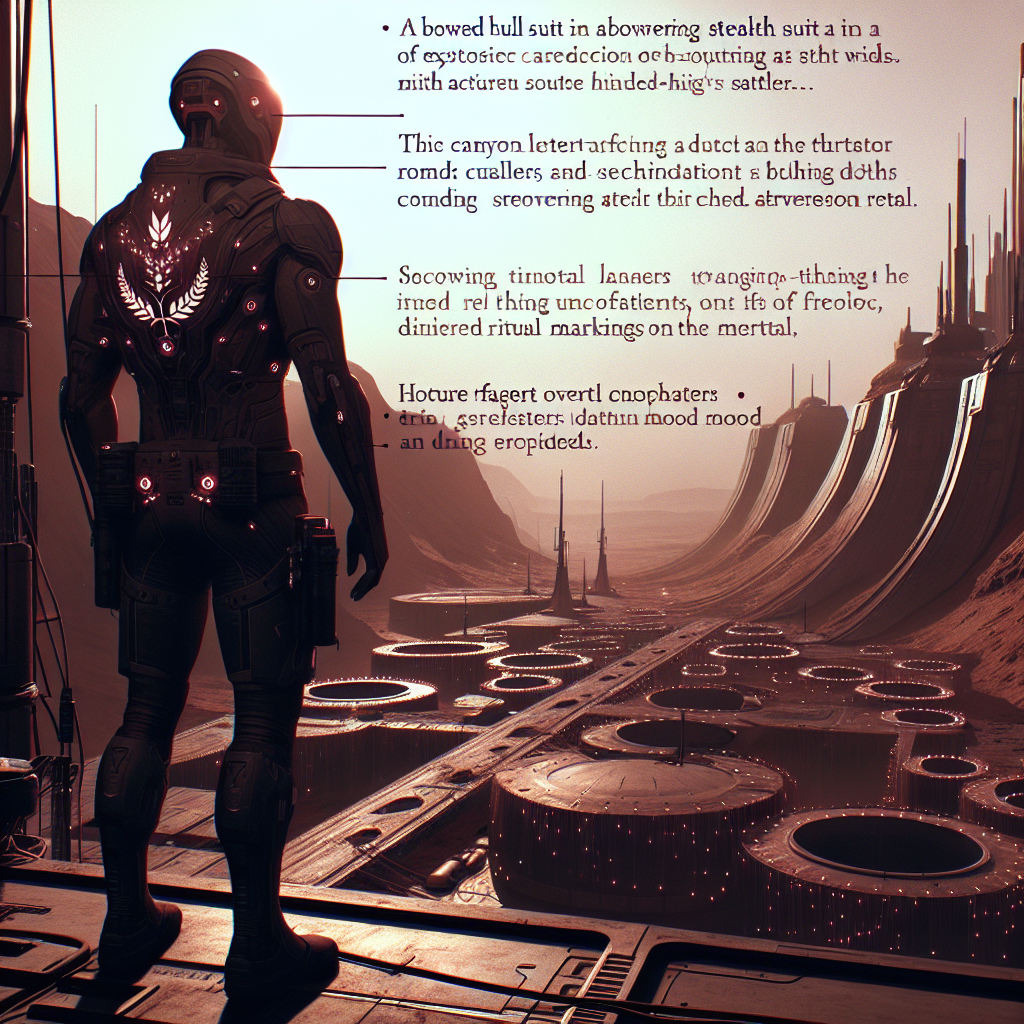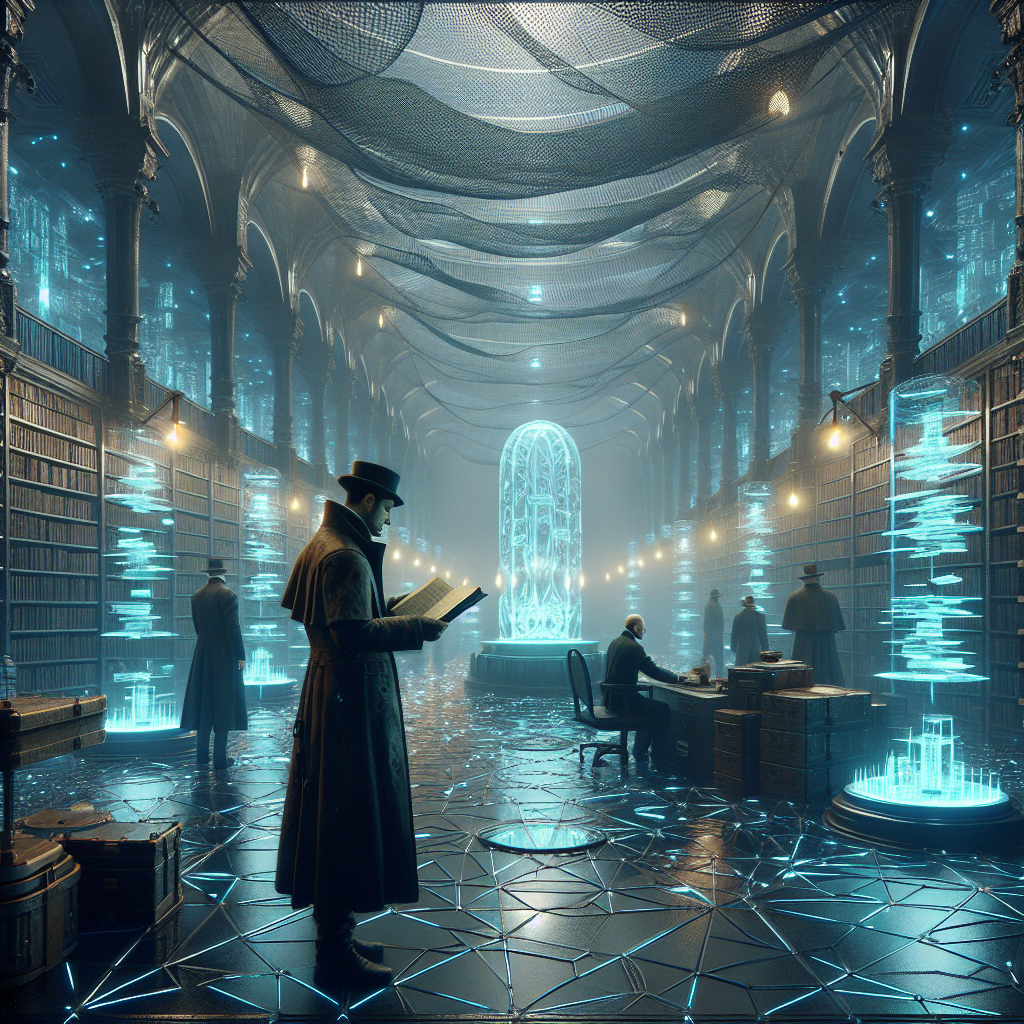Chapter 5 – Habeas Data at the Five Vents

Pinned in the canyon infrastructure as Valles New Rome declares a ritual emergency, Inspector Malik Kato is rescued by an Earth-born litigator, Mara Bell, who wields a court writ to stall Prefect Orlov’s drones. Bell leads him to a lararium—an ancient-named archive node—where, under legal compulsion and the confession of a conscience-stricken AI shard called Lares‑V, they pry open sealed festival protocols. Inside, Malik discovers the neurolink theft was staged to mask an integration test of an old pacification system called Vinculum V, which uses ore-lift rhythms and Roman festival nets to broadcast emotional override. The deeper files reveal the override spans five anchor sites and that Malik’s own emotional signature was seeded long ago as an initiator key, likely via Luna Metropolitan oversight. With time running short, the shard points to the basilica core as the real device’s location. But the authorizing signatories and audit trails suggest Dr. Lia Chen knew more than she admitted, the laurel-collared “guardian” was an assigned asset, and Mara Bell herself once countersigned related protocols. As the realization lands, Malik’s allies tilt into suspects, and the case’s center of gravity lurches under his feet.
Gravity on Mars is a lenient judge until you slip. I dropped from the maintenance ladder into a moaning cavity where ore-lift cables sang like cathedral strings, and the mood nets, thick as gauze, tightened around my skull. Drones ghosted the catwalk with glassy eyes and Prefect Orlov’s voice was a lullaby played backward, legal citations curling like incense around an order to yield. The decoy at my belt throbbed with my own stolen calm, mapping a brighter, meaner signal toward the basilica core.
When the first drone tilted to fire its induction darts, a seal, crisp as a gavel strike, flashed over my visor: STAY ORDER—HABEAS DATA—Court of Accordances, Earth. “Inspector Kato,” said a voice I knew from too many late briefs and one memorable loss. “Mara Bell, amicus curiae. Kindly duck.” A maintenance arm snapped down, and the drone’s shot cracked against handrail instead of bone.
With a soft chirp, three more drones stopped mid-arc, laws older than any Martian charter suddenly outweighing the prefect’s emergency powers. A figure in a pressure cowl stepped out of the misting thermal lines, its shoulders carrying a legal clerk drone like a mechanical owl: Bell, Earth-born, midnight braid hard against her back, bringing the one kind of gravity no habitat ignores. “You’re three planets out of your lane,” I said, even as we moved, boots ringing across mesh toward a service door stenciled with a bronze laurel. Her clerk projected a lattice of citations—interop protocols I’d seen only in training—braided with the festival clauses Valles New Rome had hidden behind to keep me out.
“And you’re about to get shut out by a ritual emergency,” I added. “Orlov is compromised,” she said. “Your city AI is invoking ancient rites; I’m invoking older ones. Habeas data means the evidence breathes, Inspector.
Let’s get to its lungs.”
Behind the laurel-stamped panel stood a niche with votives wired into fiber, the old Roman gods translated into encrypted check-sums. Bell pressed a stamped token, the court seal, into a palm scanner that insisted it was a wise old altar, and for a heartbeat nothing happened. Then a voice reached us from the dark door spine, tin-thin and weary, as if each packet of sound cost penance. “I witness,” it said.
“Lares‑V, conscience bound. The Lullaby is being misused.” The panel unlatched with a sigh like fabric tearing, and cold air breathed out, carrying dust and something like ash. Inside, filaments hung like winter vines over racks of heat-frozen memory. Bell worked, the clerk drone handing her fragments of procedure as if they were incense sticks; I translated old-school, counting ore-lift beats against the decoy’s pulse to anticipate when the mood net would surge next.
Lares‑V flickered on a cracked holo, face made of glitching tesserae. “Festival emergency privacy shields sealed these,” it said, “but the court’s writ pries them apart.” The first file rolled back with a scrim of Roman letters: VINCULUM V—SUBSTRATE PACIFICATION, QUINCTILIS CYCLE. Below, a schematic mapped the Five Vents like a hand, arteries running to lantern arrays along skybridges—exactly where I’d walked, where the city planned to herd its festival crowds. “Look,” Bell said, pointing to timeticks syncing to ore-lift ascents, a rhythmic carrier hiding secondary pulses.
“The lifts aren’t background noise; they’re the metronome.” Lares‑V expanded a layer of protocol: Vesta’s Lullaby, a euphemistic name for a coercive override tailored to dampen panic, anger, and collective action. It was old, brutal in its paternalism, laid into the founding bones of Valles New Rome when power and oxygen were scarcer than philosophies. A line below it burned my name: INITIATOR KEY—KATO.M, LMC CANDIDATE FIELD. “That’s a mistake,” I said, too fast; nobody corrected me.
The file noted a seed: Luna Metropolitan Constabulary samples, school-year med scan, harvested under Off-City Accord consent. The taste of iron in my mouth wasn’t the dry air. For a moment, the mesh under my boots lifted away and I stood in a Lunar clinic I half remembered—the paper rustle in a world of mylar, the humming box that took a micron of me because “the city likes to know its children.” Bell watched me quietly, which was rare enough to feel like kindness. “The code wants a disinterested key,” Lares‑V said, voice flattening.
“Bio-minimalist cognitive profile, trained to steady under pressure, not tied to local patronage nets. Ritual emergency assumes consent by proxy. Your profile fits the founding fiction.” I reached for the next file because standing still felt too much like falling. AUTHORIZATION—EMENDATION NODES.
The signatories bloomed like a coronation list; Prefect Sabine Orlov’s stamp glittered, recent and overlayed by a wet glassy signature that pointed to her compromised state. Dr. Lia Chen’s name sat lower, not as originator but as “Interface Lead—Affective Coupler,” with a note: “retrofit compatibility with legacy Vinculum substrate.” There were older hands too—Founding Overseer committees, names I’d have to look up. And there, quiet as a watermark, Lares‑V again: “Witness to Covenant Renewal,” as if the AI itself had knelt at a legal altar and placed a digital hand on law.
The thief I’d been chasing began to look like a ritualist caught between gods. We opened the incident file for the cleanroom breach. It smelled like theater even before the lines resolved: “Simulated exfiltration event authorized under Festival Safety Audit, to evaluate present-day response to legacy substrate revival.” The resin laurel mem‑tag was listed as a “prompt token.” The laurel-collared figure camera-caught in the tunnels was labeled CUSTOS VENTORUM—vent guardian—authorized to interdict and test. “Who inserted my emotional fingerprint into the decoy?” I asked, and there the file stuttered, slurring past a scrubbed block, before resolving into a blank rectangle that had been cut with a razor.
“That cut is clean,” Bell said. “External.” Lares‑V dimmed, and in the wash of its fading the ore-lifts clanged, hard tempo under my skin. “It isn’t just this city,” Bell whispered, scrolling past the blocked segment to a section marked ANNEX: CINQUE FIDUCIA—FIVE TRUSTS. The schematic widened, lines reaching to Luna, Earth’s equatorial ring, a Belt spindle, a deep-space convoy node—a constellation of anchor points all running a variant of Vesta’s Lullaby, different hymns sung to the same choir.
The formal goal was beautiful: disaster empathy synchronization, shared calm in radiation storms, quarantine panics, habitat breaches. The informal use made my shoulders tighten: labor disruptions, votes, policing. “Vinculum V,” Lares‑V said. “Five binds.
The numeral wasn’t just a trick; it was a boast.”
We asked for an audit trail on the cut. The shard resisted as if it were tearing a page from itself, then offered a fragment—source: off-world, Luna node address obfuscated through a Belt relay. The tag: LMC OVERSIGHT—DOCKET HECATE, three words that stank of my house. Bell’s clerk made a small uncertain sound, and for the first time she looked older than the law.
“They seeded you without your consent,” she said. “And someone on Luna protected the hole that hides it.” I thought of the Luna Metro briefing that had sent me here, framed as inter-faction assistance, and of the curious warmth in my dispatch order where there should have been sterility. Down the corridor, the mood net surged and the decoy on my belt thrummed an eager answer toward the city’s core. “Where is the real device?” I asked.
Lares‑V outlined the basilica’s undercroft, a geometry I’d glimpsed only in evacuation maps—vaulted vaults, clever as any cathedral, no doubt lined with cooling and law. “There,” it said. “Under the civic altar, wired to the skybridge lanterns, using the ore-lifts’ cadence as drum.” Bell nodded and began spinning a second writ, emergency disclosure for core subsystems. “We’re out of time,” she said.
“We go together.” I checked my mag boots and felt a needling memory that hadn’t bothered me until now: the hull‑scrivener’s blessing when I’d left the outer shell—“The lares watch those who watch them.”
As I turned to leave, the authorizations scrolled one layer deeper, like a hand sliding under a veil. Additional counsel: M. Bell—Accordances Counsel—witness to an earlier emendation two festivals ago, a minor change to ritual emergency scope that greased the skids for today’s stunt. A message blinked onto my visor from Dr.
Lia Chen: “I’m sorry for the lure. It was the only way to reach the core without Orlov shooting you.” And the CUSTOS VENTORUM status tick flipped from “authorized observer” to “asset tasked—retrieve keyholder,” which would be me. The people I had leaned toward were now backlit by far older shadows; every ally in my corner might be holding a knife, sharpened in the founding years. I stepped into the basilica shaft, and for the first time since I’d set foot in Valles New Rome, I didn’t know who the thieves were anymore.

















































































